DORSET CONSTABLES WHO WERE ARMY RESERVISTS CALLED UP IN 1899
I knew basically nothing about the Boer War. Whilst trawling through old newspaper reports I came across reports of Dorset policemen being involved, which naturally, then made me want to know of their experiences and whether they came home safely. So I set about reading about the war and trying to find out who the officers were.
The origins of the Boer Wars, as there was more than one, was mainly down to many European nations keen to acquire greater natural resources, from the continent. The Dutch settlers, known as the Boers were not happy with the advancement of other nations into their territory in Cape Colony (Southern Africa) so in the early 1840’s the three thousand Boers moved north and tried to resettle in Natal. They quickly found that the British were stifling their freedom so in 1843 they moved further north again to the more remote area of the Orange Free State. This part of South Africa was already colonised by Xhosa and Zulu tribes and after the Boers did not recognise their heritage, fighting ensued and some tribesmen became slaves.
The tribes appealed to the British to help their predicament, as many had treaty agreements with the British in the Cape Colony, and they were suffering at the hands of the Boers superior firepower. The next 35 years saw the situation deteriorate, resulting in the first Boer War in 1880 which was an embarrassing failure for the might of the British Army. Following the first Boer War, the United Kingdom’s Prime Minister, William Gladstone, granted the Boers self government in the Transvaal.
With the discovery of gold in 1886 in Transvaal, the British realised that the Boers were becoming a richer and stronger force, and over the next few years tried to regain the Boers territory. Transvaal was their target, but the Orange Free State was inconveniently placed en route to the territory and would also need to be taken.
By 1899 the Boers went on the offensive after refusing to accept the abolition of slavery, having problems with their migrant British labour in the gold mines and the British trying to annex them. Their territorial borders were surrounded and on 9th October they demanded that all the British troops be removed from their borders. Otherwise there would be another war if their demands were not met within 48 hours. The British ignored the threat and war was declared.
12,000 Boers marched towards the Cape Colony, Bechuanaland and Natal. Mounted pre-emptive strikes, were made into British held territory in Natal and the Cape Colony, besieging the British garrisons of Ladysmith, Mafeking and Kimberley. The Boers then won a series of tactical victories at Colensa, Magersfontein and Spion kop, before other British regiments were brought in to assist. The Second Boer War was possibly the first guerrilla war of modern times and started on the 11th October 1899 and ended on 31st May 1901.
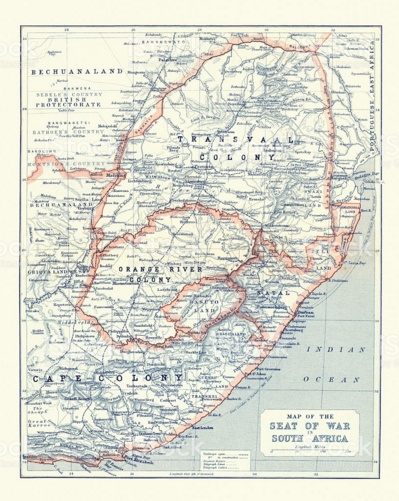
Just like modern times, many police officers had already served in the armed forces, gaining discipline and a good grounding to join their local Force, and the late 19th century was no different. Many men who had been fighting abroad and serving their country were convinced by their local policemen at home to join their County Constabularies and in Dorset the local officer received a small fee to sign up these men that were thought to be perfect for the job.
My great grandfather Arthur enlisted in the Royal Artillery in 1884 and joined Dorset County Constabulary in 1892 but was still available for call up on the Army reserve list till July 1896, so he was not one of the police men called up to serve in South Africa.
At first in 1899 the Boers were successful in their three major offensives. Whilst the British did achieve some tactical victories at Talana and Elandslaagte, there were serious defeats for them at Stromberg, Magersfontein and Colenso which was known as the Black Week, between the 10th and 15th December.
About a week after the 2nd Boer War broke out most Army Reservists were called up and informed to return to their old Regiments head quarters and this applied to six serving Dorset County Constabulary constables.
All the officers when originally joining the Army would have signed up for 12 years and anyone finishing earlier would be put on the reserve for the remaining time. Apparently, the call up system worked admirably and about 98 per cent of reservists turned up, receiving the same pay as the regular soldiers and their wives received separation allowance. The other 2 per cent were either deceased, in jail or failed the medical.
In 1900 with heavy reinforcements and the assumption of overall command by Lord ROBERTS with Lord KITCHENER as his chief of staff, the British turned the situation around. Imperial troops eventually relieved the besieged towns of Kimberley on 15th February, Ladysmith on 28th February and Mafeking on 18th May 1900. On 13th May, Lord ROBERTS occupied Bloemfontein, the capital of the Orange Free State and on 28th the province was annexed and renamed the Orange River Colony. On 31st May British troops entered Johannesburg and on 5th June the Boer capital of Pretoria was taken. The Transvaal was annexed on 1st September and by the end of November Lord ROBERTS made a triumphant return to England. Finally, in May 1902 peace was achieved by the signing of the Treaty of Vereenigin. The settlement dissolved the Boer Republics of Transvaal and the Orange Free State. The British paid the Boers three million pounds in compensation to restock and repair farmlands and in 1907 they again retained self government.
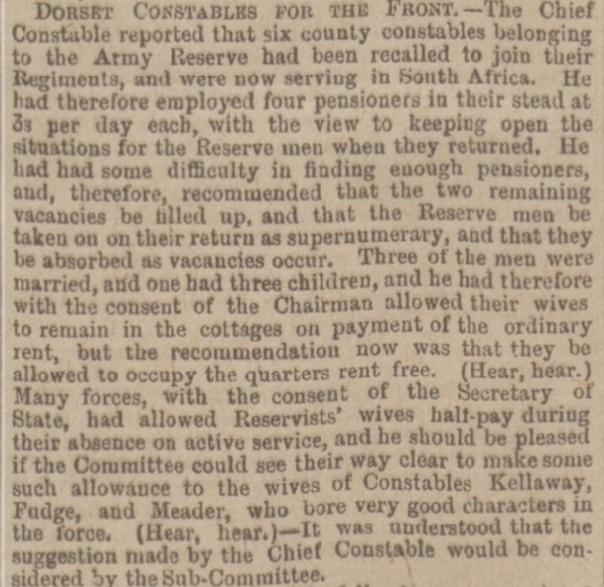
Initially only three Dorset County Constabulary names were mentioned, they were married men called KELLAWAY, MEADEN and FUDGE, and one had three children (KELLAWAY) no names were recorded of the single men so I had to hunt to find their names.
The first snippet of information came from the Western Gazette on the 17th November 1899 and referred to a PC HUNT, although at the time there were three, PC HUNT’s, John, Charles and Albert HUNT who were all serving in the Constabulary. After more research I managed to prove it was PC 100 Albert HUNT.
PC 78 ALBERT HUNT
Albert HUNT was born in Oborne, near Sherborne. In 1869 he joined the Border Regiment when he was 19 years as Private 2626. He served for 9 years doing most of his Army service, mainly in India.
On 16th August 1897 he joined the County Constabulary and after passing his three weeks basic training at HQ he was sent to the small village of Church Knowle, where he was under the supervision of Sgt Joshua RACKHAM at Corfe Castle.
I found this article in the Western Gazette which shows he had to return to his Regiment HQ at Carlisle on 20th November 1899 where the 2nd Battalion were still housed.
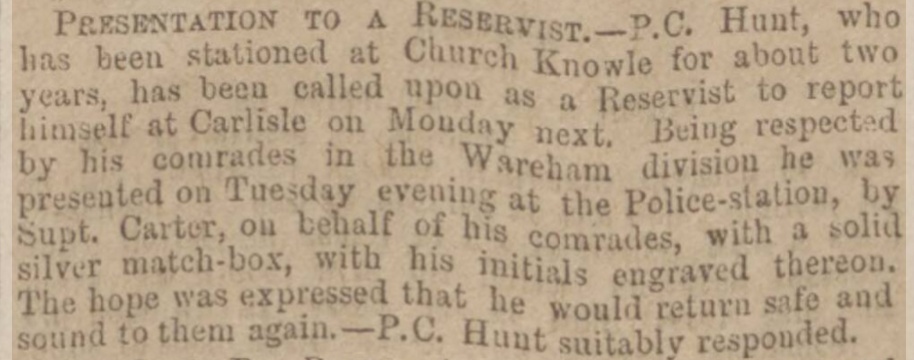
The 1st Battalion of the Border Regiment was in Malta when war threatened to break out in South Africa. At short notice they were embarked to strengthen the small garrison. They arrived in Cape Town as war was declared, and rushed to Natal to join the force which was to be commanded by Sir REDVERS BULLER to relieve Ladysmith. This was to prove yet another war where the British soldier was to suffer because of incompetence. For the Border Regiment it came early, on December 15th 1899, they attacked at Colenso with the object of crossing the River Tugela. No proper reconnaissance had been carried out. The attack proved that the river could not be crossed in daylight under fire, and heavy casualties were suffered before the retreat was ordered. After much fighting in the hills by the River Tugela, the force at last broke through and Ladysmith was relieved on 28th February 1900.
Army records show Alfred was discharged on 28 November 1901 after being at Cape Colony, Transvaal, Orange Free State, Tugela Heights and the relief of Ladysmith for which he received the Kings South Africa medal with five clasps. After completing 818 days in the Army he returned to the Dorset County Constabulary on 15th February 1902. On his return he found that a new constable had taken his place at Church Knowle and his force number had been reissued. He was now to be stationed at Okeford Fitzpaine and given the number 100.
Coincidently Sgt RACKHAM’s PC number had also been 100 years before and to cap of the connection he also became his father in law when Albert married his eldest daughter Ellen the following month.
Albert was a career PC and later on was posted to Portland and then Bridport, where he spent most of his years as the local policeman at Burton Bradstock including the Great War until he retired in August 1923 on an annual pension of 156 pounds.
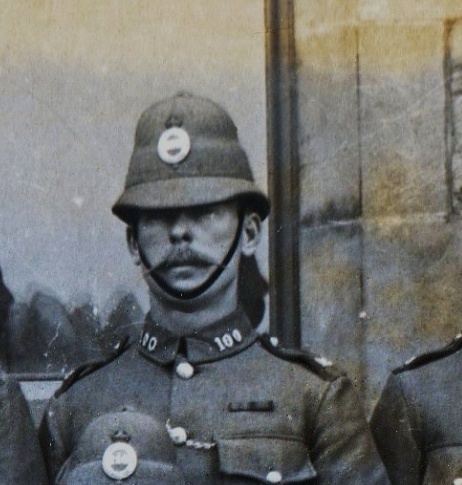
Photograph of Albert HUNT in his Dorset Constabulary uniform on Portland in about 1907, wearing his medal ribbon and a similar medal below which he would have been awarded.
Albert HUNT Oct 1870 – Aug 1941.
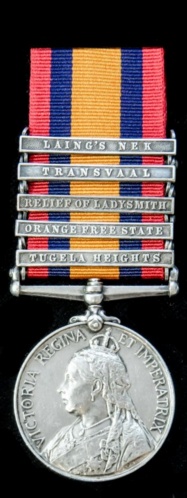
PC 132 ALBERT KELLAWAY
Albert KELLAWAY was born in 1869 at Ansty a village, just north of Milborne St Andrew, where his father was a farm labourer. In 1888 at 19 years he joined the 5th Royal Irish Lancers regiment as Pte 3338 and he probably served at Brighton and Aldershot without a main posting abroad.
In August 1893 he joined the Dorset County Constabulary as PC 132 and served at Dorchester until July 1894. He was then moved to Beaminster where he met and married his wife, and stayed there for several years before taking over as the Chideock constable. In 1897 he was one of the first eight men to be in the inaugural police sports Tug of war team, so he is one of the larger and strongest men in the Force. The below photo shows him in his tug of war clothes, where he is described as 5 ft 11 and a half tall and 15 stone 2 pounds which was a good weight in those days, although by no means the tallest and heaviest. Along with my great grandfather he was a team member for several years and they were very successful team when competing against other local Forces.
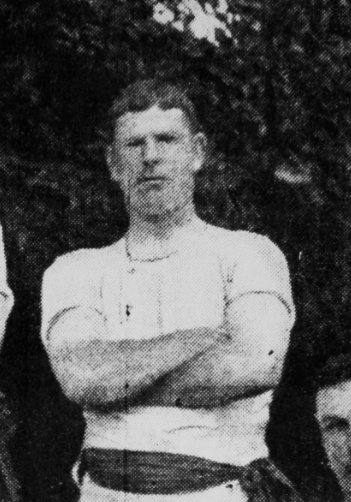
In 1899 there were about 8,000 British troops in South Africa and the 5th (Royal Irish) Lancers were part of that Force, Albert would join them in early 1900. I am not sure how long he served with the 5th Royal Irish Lancers in the Boer War, but he is recorded as fighting in Transvaal and Natal, so did not arrive early enough to join his regiment at the Relief of Ladysmith, on 28th February 1901. He appears to return to England in 1901 probably around April after also gaining the Queens South Africa medal.
He is mentioned in the 1901 census with his family as still a policeman in Beaminster, however he must have still been out of the country.
In General Orders in May, it stated that his personal number 132 was being issued to another officer as Albert had failed to return to duty. I do not know why he did not return, but I guess the appeal of emigrating was in his mind after being abroad for so long.
Here is another article from the Western Gazette.
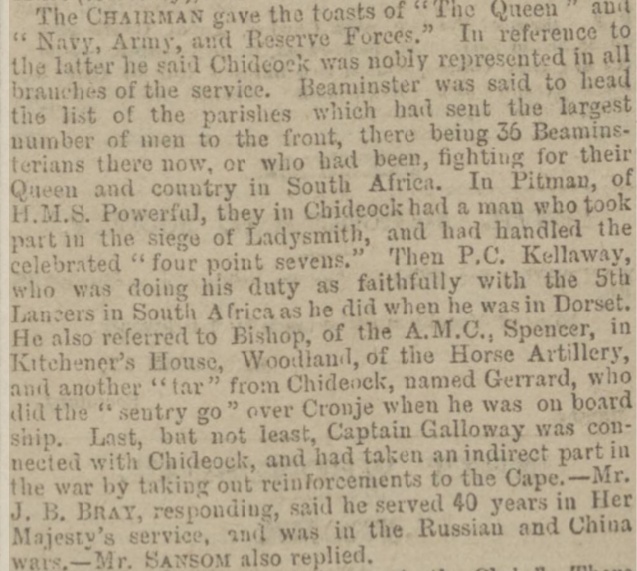
In late 1903, he and his wife, three sons and baby daughter emigrated to Quebec, Canada. Albert got a job as a chef in Canada and unfortunately his wife died a year later, leaving him with 5 kids. He remarried within 18 months to an Irish born woman and in 1922 he and his wife move south to Vermont in America, There he is mentioned as a railroad car repairer in his 60’s. He appears to return to Quebec at some point and is buried there in late 1939.
Albert KELLAWAY Aug 1869 – 22 Oct 1939
PC 113 ROBERT FUDGE
Robert FUDGE grew up in Amesbury in Wiltshire although his father was from Sturminster Newton. In 1889 he too signed up for military service and joined the 2nd Dragoon Guards as Pte 3943.
In March 1898 he joined Dorset County Constabulary as PC 113 and was posted to Wimborne where he served for 6 months and met his future wife. On 29th October he was moved to Shaftesbury where he and his new wife then moved in to the Bell Street police station. In January 1900 he received his call up letter to return to his regiment and the below articles were found in the Western Gazette to show he was given a good send off.

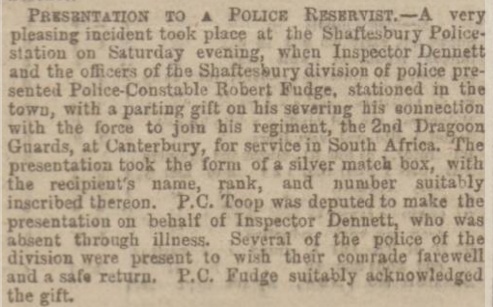
On arrival in South Africa he was quickly at the front and fought at Johannesburg, Cape Colony, Diamond Hill (June 11-12 1900) and the Orange Free State (May 29th 1900) for which he received the Queens South Africa medal.
He served in South Africa for over 2 years and finally returned to the Constabulary and his wife in May 1902 where he had found his number 113 had been reallocated and now was given number 132 which had been Albert KELLAWAY’S number.
Robert FUDGE was a career PC who completed his service, mainly in the north of the County and he retired in May 1923, on an annual pension of 152 pounds until his death in March 1948.
Robert FUDGE 9th Jul 1971 – March 1948.
Below is what his medal would have looked like.
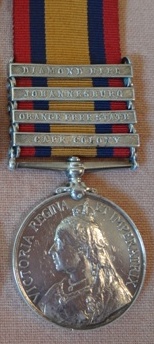
PC 115 FRED MEADEN
Frederick MEADEN was born in Weymouth in June 1872 and stayed there until in 1889 he joined the Royal Artillery as Gunner 75323. I am unsure when he left the Army for the reserve, but he joined DCC as PC 115 in November 1896. His first posting was Portland where he served for 6 months before being moved to Lyme Regis. The Bridport News reported in its newspaper on 19th January 1900 that PC MEADEN of Lyme Regis had been called up for service, so he then returned to his Regiment on the Isle of Wight. Only twenty riflemen from his old regiment were accepted to join the Hampshire Regiment as the “1st active service section of the Isle of Wight Rifles”, so as there are no records of any service abroad in South Africa. It appears he spent 340 days on the island without venturing abroad.
By Christmas 1900, he was back at Lyme Regis Police station where he found he had been replaced by new PC STUART but as Fred was a married constable he went straight away back on duty replacing him at Lyme Regis.
Fred MEADEN was also a career PC spending most of his service in the west of the county mainly, later at Netherbury.
Frederick MEADEN 3rd Jun 1872 – Sept 1959
PC 8 JOHN HEWLETT
Henry John HEWLETT was born in Sherborne in 1871 where his father was the Blacksmith at Horsecastles. When he was 18 years old, he decided to join the Army. On 3rd March 1890 he joined the 2nd Battalion of the Dorsets as Pte 3023 and signed up for 12 years. On his papers he was described on his medical as 5 ft 5 inches tall and 8 and a half stone, providing a possible reason why he did not become a Blacksmith. All of his service was described as “at home” and he was based at Plymouth, Belfast, Enniskillen, Londonderry and finally at Shorncliffe in Kent.
Henry used the name John on most of his records, although was known as Jack to complicate matters more. I shall refer to him as John to avoid confusion.
John left the Army on 27th Jan 1897 and became part of the 1st Army reserve which meant he could be called up at any time over the next 4/5 years. By all accounts he returned to Sherborne and then in March 1898 joined the Dorset County Constabulary as PC 8.
After a four month period, stationed at Dorchester John was moved to Parkstone and 2 months later was moved again to Wimborne where he served for a year and where he was called up on 13th November 1899. By the 24th November he was in South Africa with his regiment where he fought at Tugela Heights and the relief of Ladysmith. On the 16th March 1900 he was hospitalised for minor injuries. John was in hospital for over a month and although he still continues with his regiment, he returns home as an invalid but recovers. He rejoined the Constabulary on 17th December 1900 and still kept his number 8. The articles below are all taken from the Western Gazette and mention his part in the war and how bad it was.
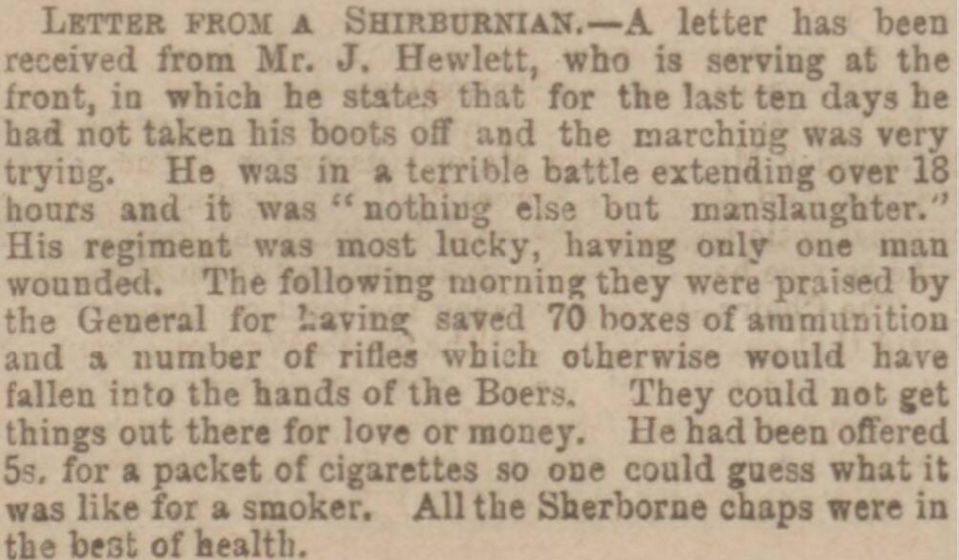
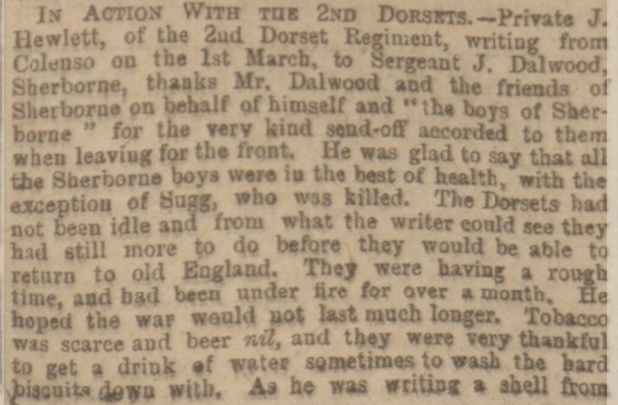
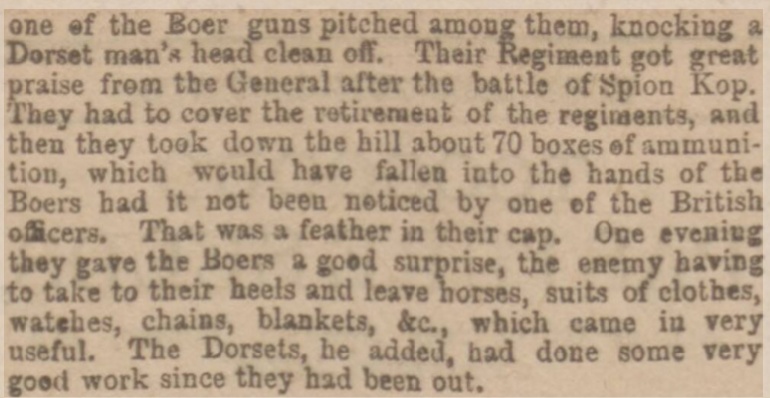
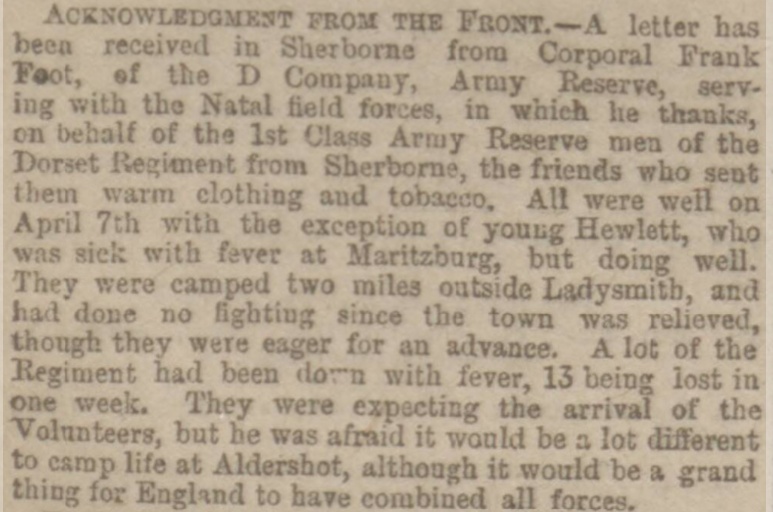
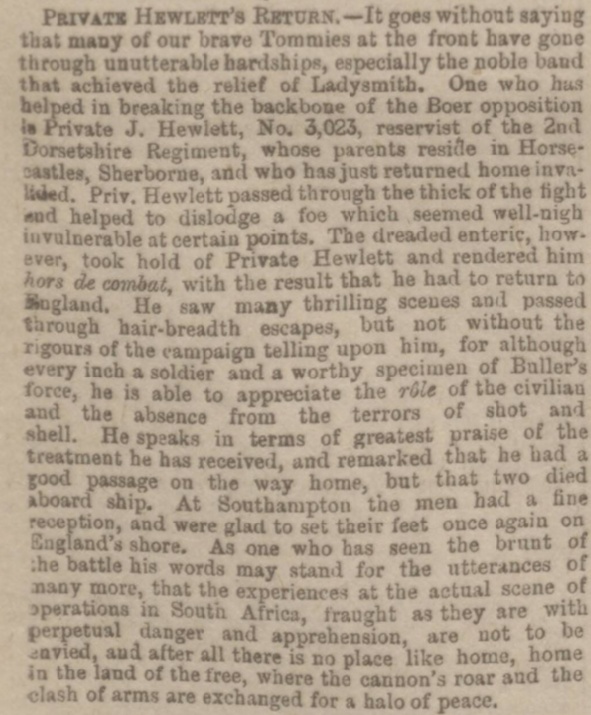
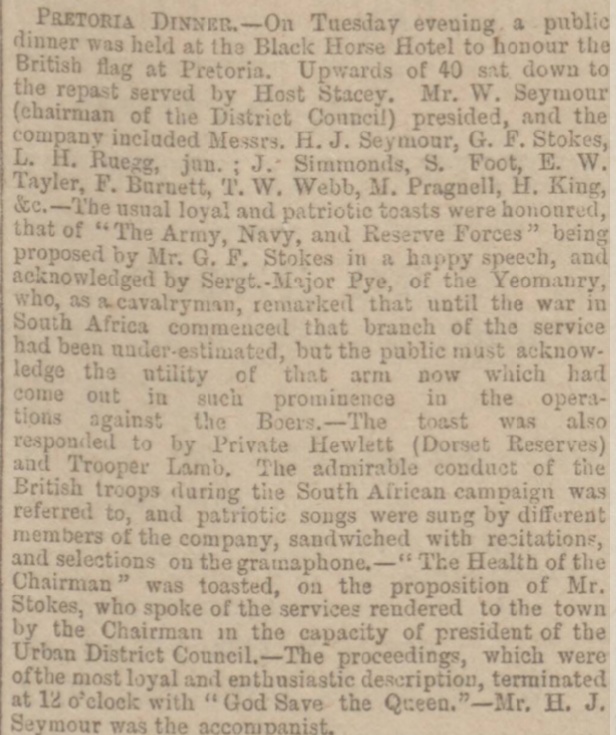
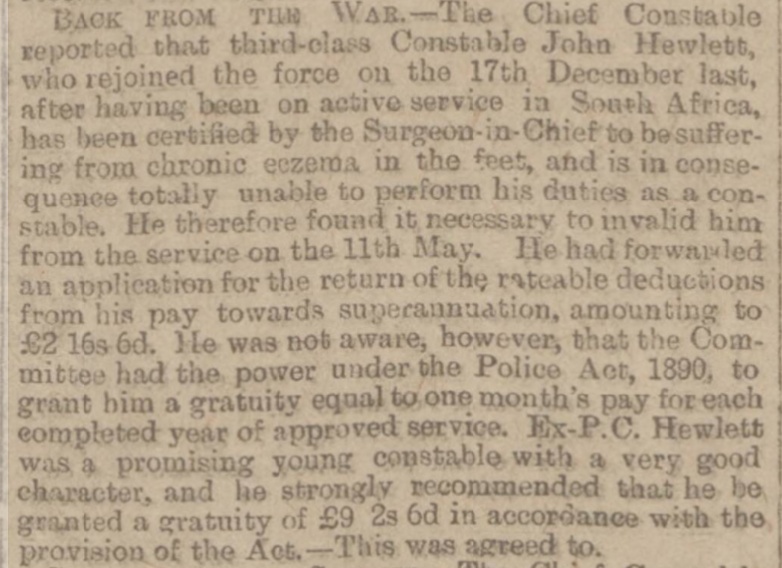
As a foot note, although John never served with the Police again records show he worked in various jobs including being, a hotel boot man, a musician and a hairdresser. He served again in the Army in the Great War for four years and was again injured in France in late 1917 when he was attached to the Labour Corps for which he received more medals.
John HEWLETT 12th Nov 1873 – 6th Feb 1946.
PC 29 THOMAS BROWN
The last of the single men who was the hardest to trace was Tom BROWN. Surprisingly, he was only one PC BROWN in the Constabulary at this time, but the Press further confused me, by also calling him PC BOWN. This did not help as there was a PC 19 Walter BOWN in the Constabulary.
PC 29 Thomas BROWN having such a common name was hard to find much information on, firstly his marriage was not correctly recorded and secondly, he does not appear to be Dorset born and he seems to have been born, coincidentally in South Africa. After checking related records, his father was In the Navy and his mother was from Devonport.
I still am not sure, of his birth date but he was born between late 1871 and early 1872. Trawling the Western Gazette I eventually found his marriage details and death after this report in late 1906.
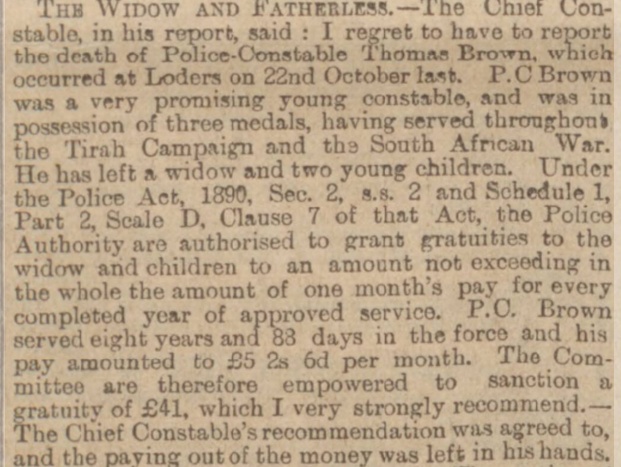
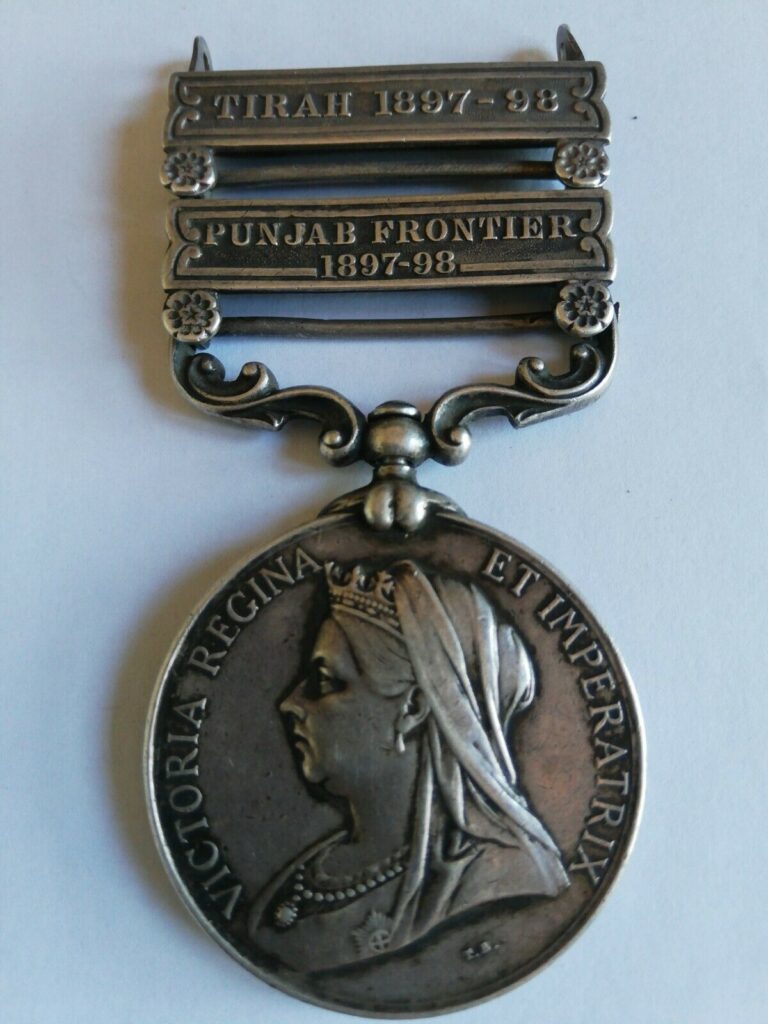
Unfortunately, it does not mention why he died so early in his life but it could be linked to his Army service. Thomas appears to have also joined the 1st Dorsets in January 1891 as Pte 3173. He may have been abroad for the 1891 Census.
Unlike his colleague John HEWLETT, Thomas seems to have served abroad all the time, being in Egypt at first and India afterwards where he ended up fighting in the Tirah campaign in 1897.
Medal similar to the one he would have been awarded.
He left the Army in 1898 and was put on the army reserve list and in July joined the Dorset County Constabulary as PC 29.
Thomas was sent to Bridport for 3 months and then moved to Pulham where during his year there, he met his future wife. His future wife was a kitchen maid at the nearby West Hall house, at Folke which was owned by a retired Major from the Royal Artillery. In September 1899 he was again on the move and transferred to Wimborne, where like John HEWLETT he received his call up letter from his old regiment.
Thomas was now part of the 2nd Battalion which sailed on the Simla ship, on 28th November 1899, arriving at the Cape about 17th December, and then they were sent to Durban. Along with the 2nd Somerset Light Infantry and 2nd Middlesex they formed the 10th Brigade under Major General TALBOT COKE, and part of the 5th Division under Sir C WARREN.
In General WARREN’s despatch of 1st February 1900, the Dorset’s were mentioned as “rendering great service in carrying down a large quantity of ammunition in the dark which would otherwise have fallen into the hands of the enemy”. The detachment which acted as burial party on the 27th under trying circumstances, were also praised for their admirable discipline. The 10th Brigade were then involved in the fighting between 13th and 27th February. On the 21st the brigade crossed the Tugela and occupied the Colenso position north of the river, but not without severe fighting, in which the Somerset’s lost men very heavily. Up till the 27th the brigade held positions, chiefly between the Tugela and the Onderbrook, and were constantly under fire, except during the armistice on the 25th.
After the relief of Ladysmith, the 5th Division was put under the command of General HILDYARD. The division followed the railway line forward to Dundee, and when General BULLER was ready to turn the Laing’s Nek position the 10th Brigade got an honourable place. The brigade now consisted of the Dorset’s, Middlesex, and 1st Dublin Fusiliers, the Somerset’s having now gone to Cape Colony.
On 6th June General COKE occupied Vanwyk’s Mountain, where he prepared to seize control of Botha’s Pass. That night, they had the hard work of getting their big naval and other guns up the mountain. On the 8th Botha’s Pass was attacked and captured by the 2nd and 11th Brigades, the 10th assisting from Vanwyk. The force moved forward, and on the 11th June, they fought the battle for Alleman’s Nek. The 10th Brigade, Dorset’s leading, attacked and captured the hill on the right of the Nek, which was a very strong position. The advance was admirably made, and the troops who were involved, were highly praised by General BULLER.
In his despatch of 19th June, he said, he was much pleased with the Dorset’s action. Two officers, a colour-sergeant, and a private were mentioned in that despatch, and 5 officers and 2 non-commissioned officers in a later despatch. The battalion’s losses were approximately 9 men killed, 2 officers and 53 men wounded.
In Lord ROBERTS’ final despatch 7 officers and 12 non-commissioned officers and men were mentioned.
After the Pretoria-Natal Railway had been occupied the 5th Division was chiefly engaged in marching through and occupying the south-east portion of the Transvaal, acting as garrison at Wakkerstroom and other posts in that district. Their task frequently involved fighting, the most severe was undoubtedly that which arose from the Boers attempt to reinvade Natal in September 1901. On the 26th Fort Prospect, which was garrisoned by 35 men of the Dorset Mounted Infantry and 51 of the Durham Artillery Militia under Captain Rowley of the Dorset’s, was attacked by 500 Boers. The enemy under cover of a mist got within 20 yards of the sangars held by the militiamen, but they held out and with aid drove off the attack. At all other points the enemy was repulsed after thirteen hours’ fighting. Thanks to admirably constructed defences, the losses of the garrison were only 1 killed and 8 wounded. Captain ROWLEY and his little force were congratulated by General LYTTELTON and Lord KITCHENER.
Throughout the summer of 1901 the battalion did a lot of heavy marching as the infantry of a column under Brigadier General BULLOCK which operated chiefly in the south-east of the Transvaal and in the north of the Orange River Colony and between the Delagoa and Natal Railways. A section from the Dorset’s Regiment was in the 2nd Battalion Mounted Infantry, and a sketch of the work of their company is given under the Argyll and Sutherland Highlanders.
During the latter phases of the war 2 officers and 8 non-commissioned officers and men were mentioned by Lord Kitchener in despatches for gallant work, and in his final despatch the names of 4 officers and 5 non-commissioned officers and men were added.
Thomas was a foot soldier during his time at the front in South Africa with the 2nd Battalion and fought continuously, throughout 1901. He continued serving in 1902 in Africa for which he received the Kings South African medal with clasps for South Africa 1901 and 1902.
Thomas was the longest serving and last of the 6 PC’s to return to the Constabulary in October 1902. After so long away his number 29 had also been reissued, he was now PC 63 and 6 months later he was married at Pulham. He again returned to police duties at Wimborne, then later was posted to Toller Porcorum, before a short time as the local PC at Loders, prior to his death. After much research I still am not sure of what became of his wife and children.
Below is a similar medal to that he would have been awarded.
Thomas BROWN Mar 1872 – 22nd Oct 1906
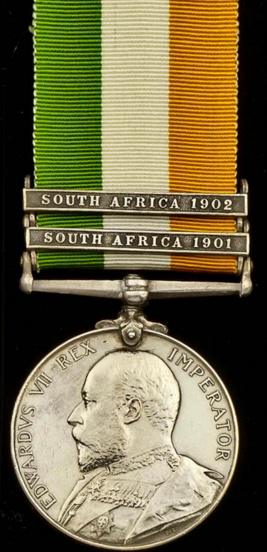
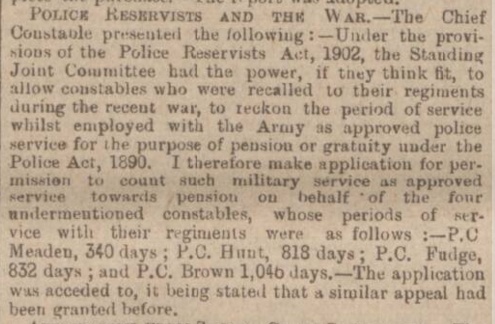
MEDALS AWARDED FROM THE BOER WAR
Medals were given with clasps to show what arenas men fought in.
26 clasps were issued.
State Clasps
CAPE COLONY(CC): 11 October 1899 – 31 May 1902
All troops in Cape Colony at anytime between 11th October 1899 and 31st May 1902, inclusive, who had not received a clasp for a specific action in the Cape Colony or the “Natal” clasp
NATAL: 11 October 1899 and 11 June 1900
All troops in Natal at any time between 11th October 1899 and 11th June 1900, both dates inclusive who had not received a clasp for a specific action in Natal or the Cape Colony.
RHODESIA: 11 October 1899 – 17 May 1900
All troops who were under the command of Lieut. General Sir F. Carrington and Colonel Plumer in Rhodesia between 11th October 1899 and 17th May 1900, both dates inclusive, or who landed at Beira between 11th October 1899 and the 25th May 1900, both dates inclusive.
ORANGE FREE STATE(OFS): 28 February 1900 – 31 May 1902
All troops in Orange River Colony at any time between 28th February 1900 and 31st May 1902, inclusive who had not received a clasp for a specific action in the Orange River Colony.
TRANSVAAL: 24 May 1900 and 31 May 1902
All troops in the Transvaal at any time between 24th May 1900 and 31sy May 1902, inclusive who had not received a clasp for a specific action in the Transvaal.
SOUTH AFRICA: 1901 – 1st January 1901 – 31st December 1901.
Awarded to those not eligible for the King’s Medal although they had served at the front between 1 January and 31 December 1901.
SOUTH AFRICA: 1902 – 1st January 1902 – 31st May 1902
Awarded to those not eligible for the King’s Medal although they had served at the front between 1 January and 31 May 1902.
DEFENCE OF MAFEKING: 13 October 1899 – 17 May 1900 (CC)
All troops in the garrison of Mafeking between 13th October 1899 and 17th May 1900, both dates inclusive.
DEFENCE OF KIMBERLEY: 15 October 1899 – 15 February 1900 (CC)
All troops in the garrison of Kimberley between 14th October 1899 and 15th February 1900, both dates inclusive.
TALANA: 20 October 1899 (Natal)
All troops under Lieut .General Sir W. Penn Symon’s command on 20th October 1899 who were north of an ease and west line drawn through Waschbank station.
ELANDS-LAAGTE: 21 October 1899 (Natal)
All troops at Elandslaagte on 21st October 1899 who were on the right bank of the Sunday river and North of an east and west line through Buys Farm.
DEFENCE OF LADYSMITH: 3 November 1899 – 28 February 1900 (Natal)
All troops in Ladysmith between 3rd November 1899 and 28th February 1900, both dates inclusive.
BELMONT: 23 November 1899 (CC)
All troops under Lieut. General Lord Methuen’s command who were north of Witteputs (*exclusive) on 23rd November 1899.
MODDER RIVER: 28 November 1899 (CC)
All troops under Lieut Lord Methuen’s command who were north of Honey Nest Kloof (exclusive), and south of the Magersfontein ridge (exclusive) on 28th November 1899.
RELIEF OF LADYSMITH: 15 December 1899 – 28 February 1900 (Natal)
All troops in Natal north of and including Estcourt between 15th December 1899 and 28th February 1900, both dates inclusive.
TUGELA HEIGHTS: 12–27 February 1900 (Natal)
All troops of the Natal Field Force, exclusive of the Ladysmith garrison, employed in the operations north of an east and west line through Chievelely Station between the 14th and 27th February 1900, both dates inclusive.
RELIEF OF KIMBERLEY: 15 February 1900 (CC)
All troops in the relief column under Lieut. General French who marched from Klip Drift on the 15th February 1900 and all the 6th Division under Lieut. General Kelly-Kenny who were within 7,000 yards of Klip Drift on 15th February 1900.
PAARDEBERG: 17–26 February 1900 (OFS)
All troops within 7,000 yards of General Cronje’s final laager, between midnight of the 17th and midnight of the 26th February 1900, and to all troops within 7,000 yards of Koodoe’s Rand Drift between the same dates.
DRIEFONTEIN: 10 March 1900 (OFS)
Awarded to troops serving with Army Headquarters and Lieut Gen French’s column which advanced from Popular Grove on 10 March 1900
WEPENER: 9–25 April 1900 (OFS)
All troops engaged in the defence of Wepener between 9th April 1900 and 25th April 1900, both dates inclusive.
RELIEF OF MAFEKING: 17 May 1900 (CC)
All troops under the command of Colonel Mahon who marched from Barkly West on 4th May 1900 and all troops who were under Colonel Plumer’s command between 11th October 1899 and 17th May 1900,both dates inclusive, and who were south of an east and west line drawn through Palachwe
JOHANNESBURG: 29th May 1900 (Transvaal)
Awarded to those troops who, on 29 May 1900, were north of an east and west line through Klip River Station and east of a north and south line through Krugersdorp Station.
DIAMOND HILL: 11–12 June 1900 (Transvaal)
All troops who, on 11th or 12th June 1900, were east of a north and south line drawn through Silverton Siding and north of an east and west line through Vlakfontein
WITTEBERGEN: 1–29 July 1900 (OFS)
All troops who were inside a line drawn from Harrismith to Bethlehem, then to Senekal and Clocolan, along the Basuto border and back to Harrismith, between 1st and 29th July 1900, both dates inclusive.
BELFAST: 26 or 27 August 1900 (Transvaal)
Awarded to troops who, on 26 or 27 August 1900, were east of a north and south line drawn through Wonderfonein, and west of a north and south line through Dalmanutha Station, and north of an east and west line drawn through Carolina.
LAING’S NEK: 12 June 1900 (Natal)
All troops of the Natal Field Force employed in the operations and north of an east and west line through Newcastle between 2nd and 9th June 1900, both dates inclusive.
KINGS MEDAL
This second campaign medal for the South African or ‘Boer War’ was instituted in 1902, for award to all those who were in theatre on or after the 1st January 1902, and had completed 18 months service in the conflict prior to 1st June 1902. Service did not have to be continuous, but even with continuous service the recipient would have had to serve from December 1900 to have 18 months service before the war ended in May 1902 (and commencing before the death of Queen Victoria on 22 January 1901). The medal was to recognise service in the difficult latter phases of the war and reward those who by their long service in field had brought the campaign to a successful conclusion. The medal was never awarded singly and was always paired with the Queen’s South Africa Medal.